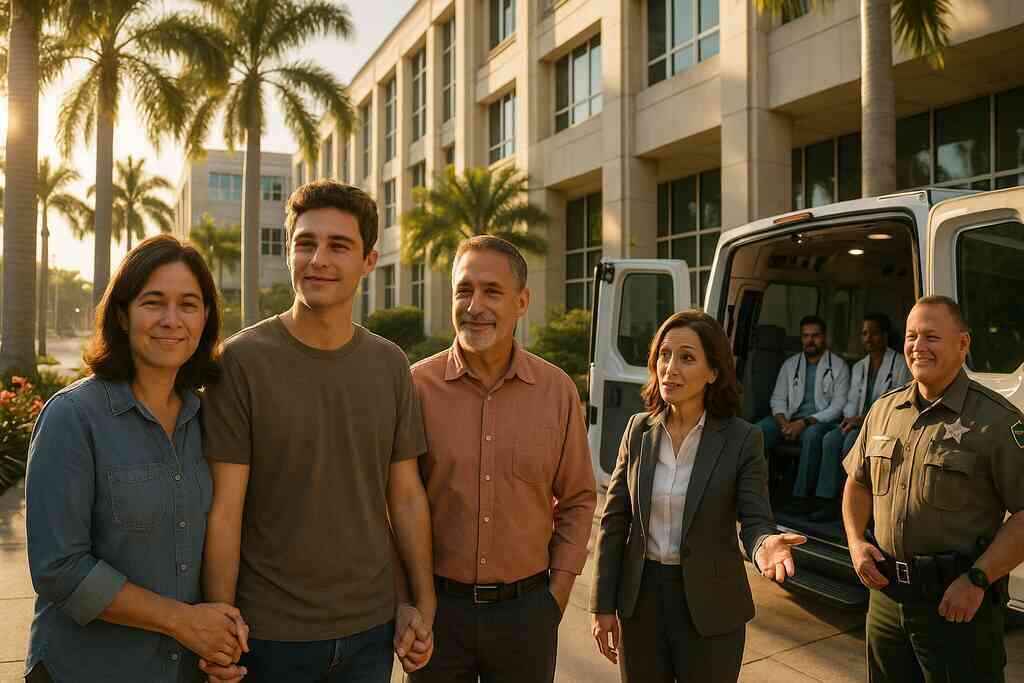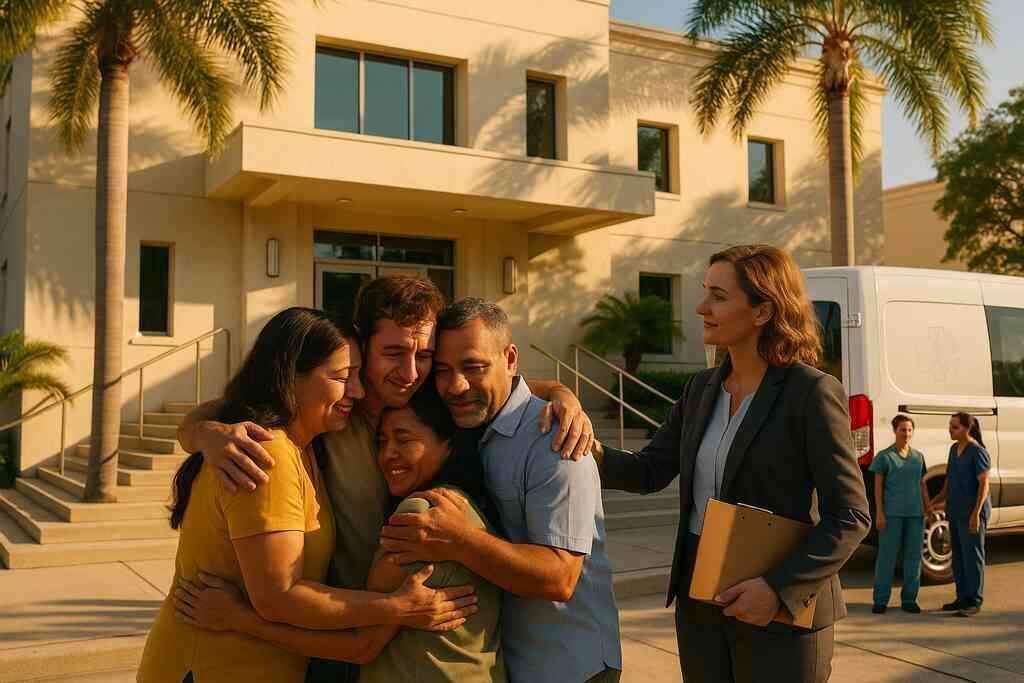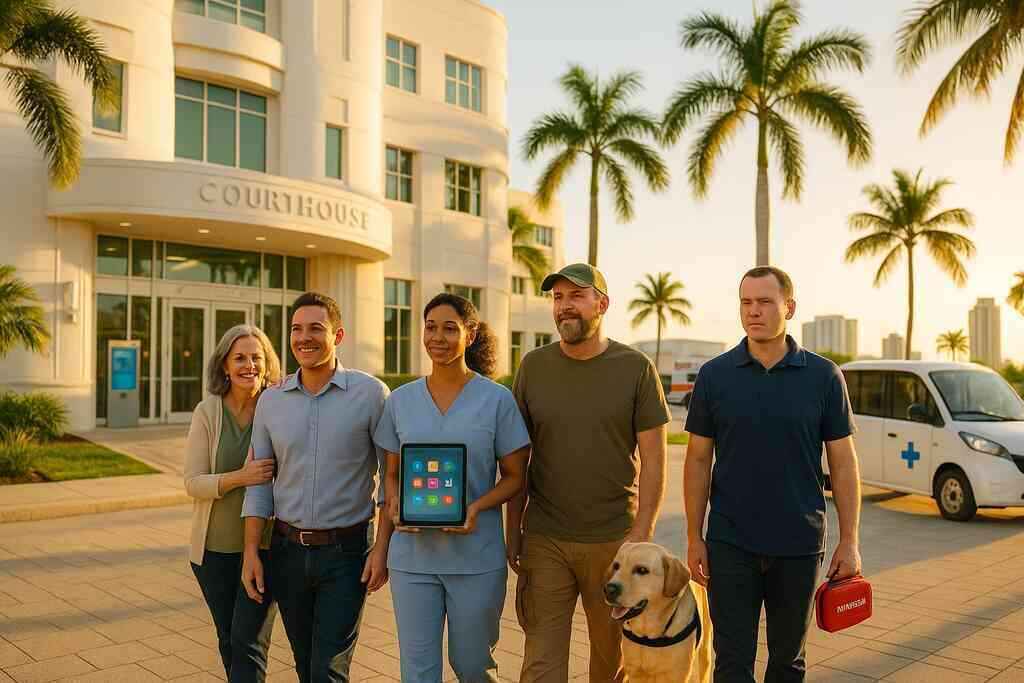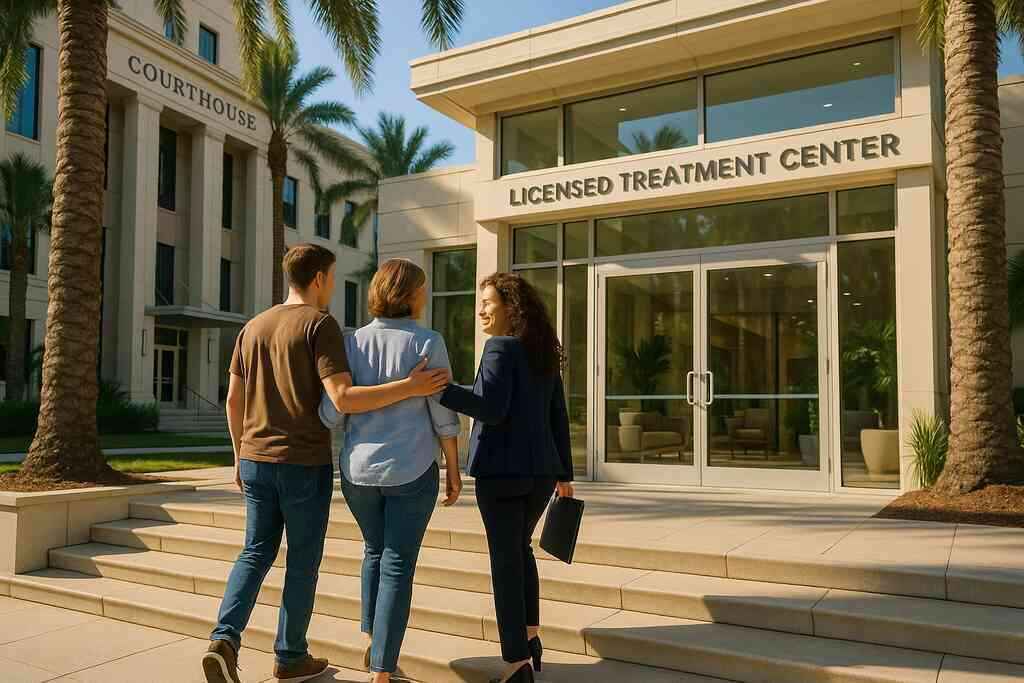When Love Meets Law: A Broward Family Introduction
Why Broward County Marchman Act help matters today
Families in Broward wake each morning praying their loved one survived another chaotic night. Overdoses, fentanyl contamination, and isolation have pushed our community to a tipping point. That urgency explains why the Broward County Marchman Act help feels less like paperwork and more like CPR. The statute lets relatives ask a judge to order detox and treatment before tragedy strikes. Our team offers an overview of Marchman Act services for families so caregivers can act confidently, not fearfully.
Unlike voluntary rehab referrals, the Marchman Act uses Florida civil procedures to override denial safely. That distinction matters because many substance users promise to quit tomorrow but never make it through today. Broward judges balance liberty with life, granting temporary holds only when clear evidence proves impairment and danger. The process respects due-process rights, yet it still moves faster than private negotiations among exhausted relatives. Understanding this harmony between compassion and law prepares families for the next steps described below.
Involuntary addiction treatment for Broward families explained in plain language
Involuntary addiction treatment for Broward families begins with a sworn petition filed at the county clerk’s office. Two adults with direct knowledge of substance misuse sign affidavits describing recent impairment, threats, or self-neglect. The clerk schedules a quick hearing where a judge reviews testimony, medical records, and drug screens if available. If the court finds probable cause, deputies transport the individual to a licensed detox center for assessment. Within five days, clinicians submit a treatment recommendation, allowing the judge to order extended care up to ninety days.
Think of the Marchman Act as a medical guardianship limited to addiction rather than finances or dementia. Families keep decision-making authority, yet professionals handle dosing, counseling, and urine testing. That structure relieves loved ones from playing police, doctor, and banker simultaneously. Human dignity remains central; patients receive notice, legal counsel, and the right to contest findings. Most importantly, the statute forces insurers and state programs to fund evidence-based treatment, not endless emergency visits.
The Florida civil court addiction intervention process may sound daunting, yet most petitions resolve within two brief hearings. Clerks provide template forms, and our counselors supply sample narratives that match statutory criteria word for word. You do not need a lawyer, though supportive legal counsel can streamline service of process and evidentiary rules. The petition for loved one substance abuse in Florida stays confidential, shielding families from gossip and employment backlash. Privacy encourages honest testimony, further increasing the chance that judges will order appropriate care on the first attempt.
Recognizing the urgent signs of withdrawal families should watch for
Recognizing the signs of withdrawal families should watch for separate proactive guardians from bystanders. Common early indicators include rapid mood swings, unexplained flu-like symptoms, and secretive behavior around finances or medications. These red flags often precede full-blown physiological withdrawal that can cause seizures, hallucinations, or deadly dehydration. Families who study the warning signs of drug withdrawal recognize patterns sooner and document them for court evidence. Accurate logs of dates, behaviors, and hospital visits strengthen a petition and protect relatives from accusations of exaggeration.
Withdrawal rarely unfolds in a straight line; symptoms crest, fade, and return as tolerance fluctuates. Alcohol shakes may quiet temporarily, only to roar back when blood ethanol plummets overnight. Similarly, benzodiazepine rebound anxiety can look like panic unrelated to drugs unless you track dosing intervals. Photograph empty pill bottles, missed work notices, and bruises resulting from blackouts. Such tangible proof convinces Broward judges that intervention is necessary, not merely preferable.
Keep in mind that stimulant crashes present differently, featuring exhaustion, depression, and suicidal thoughts rather than tremors. Opioid withdrawal, by contrast, triggers yawning, gooseflesh, and relentless muscle pain that drives renewed use. Knowing these distinctions guides emergency calls and informs the treatment plan once the Marchman order issues. Education also alleviates shame because relatives finally see addiction as an illness, not an ethical failure. Compassion plus documentation equals the strongest formula for saving a life through lawful intervention.
Decoding the Courtroom Route to Recovery
Step by step petition for loved one substance abuse in Florida
Filing a petition for loved one substance abuse in Florida starts with calm planning, not frantic guesswork. Families gather hospital records, police reports, and text messages that prove impairment and danger. Two adults sign affidavits, swearing the facts occurred within recent weeks. The clerk reviews signatures, verifies residency, and schedules a hearing usually faster than private negotiations ever move. This structured roadmap reassures caregivers who fear the unknown while their relatives spiral further into risk.
Once the clerk stamps the documents, service of process becomes the next milestone. Sheriff deputies formally deliver the summons, ensuring constitutional notice even when the individual is hiding. Many petitioners worry confrontation will spark violence, yet deputies are trained for compassionate interaction. After delivery, the hearing generally occurs within a few days, allowing judicial review before circumstances deteriorate. Clear evidence and respectful demeanor during testimony often persuade the judge to issue a short-term stabilization order.
Navigating Florida civil court addiction intervention process and Broward judges specialized in Marchman cases
The Florida civil court addiction intervention process differs from ordinary lawsuits because time is brain, liver, and life. Specialized Broward judges fast-track Marchman dockets during dedicated calendar blocks. They prioritize medical urgency while safeguarding civil liberties through appointed counsel and sworn testimony. Court officers verify treatment bed availability in real time, preventing impractical orders that strand families in hallways. This partnership between bench and behavioral health separates Broward from less experienced jurisdictions.
Preparation remains essential even with a sympathetic judiciary. Arrive with chronological logs, third-party affidavits, and a concise statement of requested relief. Judges appreciate brevity that highlights imminent harm, not decades of family drama. When evidence matches statutory language, the bench often authorizes transport that same afternoon. Conversely, vague stories of disrespect or laziness rarely meet the legal burden, so practicing precise language beforehand pays dividends.
Marchman Act versus Baker Act differences every caregiver must understand
Confusion between the Marchman Act and the Baker Act breeds hesitation, yet clarity saves lives. The Baker Act targets acute mental illness threatening self or others, whereas the Marchman Act addresses substance impairment jeopardizing health or safety. Baker occurs in psychiatric settings with medication management focused on mood stabilization. Marchman commitments, by contrast, route individuals to detox units or residential programs emphasizing withdrawal management and relapse prevention. Knowing which statute fits the crisis prevents fruitless filings and wasted emotional energy.
Caregivers also must recognize due-process timelines vary. Baker evaluations lengthen to seventy-two hours, while Marchman assessments often span five days followed by possible ninety-day treatment. Insurance coverage likewise differs because many plans consider psychiatric admission medically necessary more readily. To gain deeper insight, families can explore resources such as understanding the Baker Act differences before deciding which path aligns with their loved one’s presentation.
Family guide to Florida Supreme Court and district court rulings that shape your rights
Several landmark Florida Supreme Court opinions affirm that addiction constitutes a medical condition meriting compulsory care when voluntary options fail. These rulings prevent local governments from imposing impossible evidentiary hurdles that would delay intervention until tragedy strikes. District courts have refined procedures, ruling that hearsay is admissible at probable-cause hearings but not at final adjudication. Such decisions streamline early action without sacrificing fairness at later stages.
Understanding appellate guidance empowers families during objections raised by defense counsel. When an attorney argues violation of privacy, petitioners can cite precedent reaffirming protective seals on Marchman records. If a judge hesitates to extend treatment beyond thirty days, case law illustrates when extended commitments remain constitutional. Mastery of these rulings transforms nervous relatives into informed advocates navigating Florida district courts for treatment petitions with confidence.
Practical costs and funding pathways for securing court ordered rehab in Broward
Financing recovery often scares caregivers more than courtroom forms. Fortunately, Broward offers layered funding that matches clinical intensity with fiscal reality. State grants cover detox for uninsured residents who meet income thresholds, while Medicaid expansion broadens eligibility for medication-assisted treatment. Private insurers must comply with parity laws, though persistent phone advocacy sometimes proves necessary. Hospitals frequently write letters confirming medical necessity, reducing preauthorization delays.
Treatment centers also negotiate payment plans, recognizing that families already shoulder emotional bankruptcy. Sliding scales combine household income, dependent count, and prior treatment history to generate fair rates. Veteran benefits, crime victim funds, and faith-based scholarships add further options. For a single directory of court ordered rehab options in Broward County, families can consult reputable local resources offering transparent cost breakdowns. Early budget planning eliminates last-minute sticker shock that might derail momentum toward vital care.
How to file Florida civil lawsuits for addiction help with supportive legal counsel
Although the Marchman Act functions within civil court, it still qualifies as litigation, complete with motions, continuances, and evidentiary objections. Retaining supportive legal counsel ensures petitions meet technical requirements while preserving family relationships. Lawyers draft concise pleadings, coordinate sheriff service, and argue jurisdictional nuances if a respondent crosses county lines. They also shield petitioners from direct confrontation, reducing emotional ambush during hearings.
Legal fees need not be prohibitive. Many attorneys offer flat-rate packages covering document preparation, two court appearances, and dismissal motions if sobriety stabilizes early. Some accept payment plans aligned with treatment milestones, echoing the recovery journey they help launch. Pro bono clinics occasionally accept cases involving minors or veterans, reflecting public commitment to combating addiction’s ripple effects. Engaging counsel sooner rather than later avoids procedural missteps that could force a painful refiling.
Emergency substance use commitment near me and the timeline for the Marchman Act process
Crisis rarely waits for business hours, which is why families search phrases like emergency substance use commitment near me at three in the morning. The Marchman Act accommodates urgency through ex parte orders when immediate danger exists. Deputies can transport a loved one directly from home, a motel, or an emergency department to licensed detox. Medical evaluations begin within twenty-four hours, stabilizing vital signs before legal hearings confirm ongoing need.
Timelines then shift to structured review rather than chaotic reaction. Assessment reports reach the bench within five days, and follow-up hearings determine lengths of stay extending up to ninety days. Judges retain authority to renew treatment if relapse looms, provided new evidence supports continued risk. Regular status checks foster accountability while giving families breathing room to heal. Tracking each milestone on a shared calendar turns a daunting legal saga into a manageable sequence toward lasting recovery.

Beyond the Bench Building: a Continuum of Care
Emergency detox options in Broward hospitals and intensive outpatient programs after a Marchman order
First responders often bring a newly Marchman-acted adult straight from court to specialized emergency rooms. These hospital units maintain rapid protocols for medical clearance, benzodiazepine tapers, and electrolyte management. Families appreciate that Broward institutions accept the court order without debate, preventing discharge against medical advice. Social workers then coordinate transportation to licensed detox wings, ensuring the treatment clock never pauses. This seamless handoff calms relatives who have already endured frantic nights searching “emergency detox options in Broward hospitals” on their phones.
Once vital signs stabilize, clinicians shift focus to structured therapy instead of constant monitoring. Many patients graduate into Intensive Outpatient Programs that meet several days each week while allowing community reintegration. If you wonder what an intensive outpatient program, think of it as the academic semester between detox and full independence. Group counseling, medication management, and family sessions occur under tight attendance rules enforced by the same judge who signed the Marchman order. Court oversight keeps motivation high while avoiding extended inpatient costs.
Continuum of care with RECO Intensive services and RECO Institute step down housing options
Detox alone rarely rewires the brain, so Broward families look south to Delray Beach for next-level solutions. The renowned RECO Intensive campus offers trauma therapy, vocational coaching, and neurofeedback under one roof. Their clinicians respect the legal framework of the Florida Marchman Act, providing judges with weekly progress notes. Participants remain accountable yet empowered by personalized scheduling and evidence-based modalities. Parents often describe watching hope return to their loved one’s eyes during these transformative weeks.
Housing stability also matters, which is why the adjoining RECO Institute maintains structured residences with curfews and peer mentors. This step-down arrangement prevents the sudden shocks that can trigger relapse after residential care. Residents practice budgeting, meal planning, and job-search etiquette while still attending daytime therapy. The program’s layered approach fulfills the statute’s call for “least restrictive yet effective” care. Curious caregivers can explore the full continuum of care at RECO Intensive in Delray Beach to visualize the journey from crisis to competence.
Transition to sober living at Top Sober House and other addiction treatment services near me
When formal treatment ends, community housing offers the structure missing in many family homes. Top Sober House operates gender-specific residences with house managers who enforce curfews, chore lists, and drug testing. Residents share responsibilities, attend nightly check-ins, and celebrate milestones together. This peer-driven accountability reinforces skills learned during therapy while lowering the risk of isolation. For families searching “addiction treatment services near me,” these homes bridge the gap between clinical care and full independence.
Broward’s recovery ecosystem also includes mentorship programs, employment readiness workshops, and faith-based fellowships. Local colleges grant tuition waivers for individuals completing sober-living milestones, creating momentum toward long-term goals. Transportation vouchers and employer partnerships further reduce barriers to success. The Marchman Act may have launched the journey, yet community support sustains it. Graduates frequently return to share testimonies, proving that sobriety multiplies when modeled in daily life.
Connecting with AA meetings in Broward County and NA meetings resources near you
Twelve-step fellowships remain a cornerstone of relapse prevention because they provide daily reinforcement at zero cost. Broward County hosts meetings from sunrise to midnight, allowing schedule flexibility for workers and students. Many venues offer hybrid formats, blending in-person camaraderie with online access for those without transportation. Sponsors guide newcomers through the Steps, explaining traditions that safeguard anonymity and humility. Consistent attendance builds a social network grounded in honesty, not substance use.
Families can use statewide directories to help loved ones locate convenient gatherings. A simple click on find AA meetings near Broward families reveals addresses, accessibility notes, and language options. Similar platforms list NA meetings, which resonate with individuals whose drug of choice differs from alcohol. Combining fellowship with ongoing therapy doubles the protective effect against cravings. Judges often recommend at least three meetings weekly, a guideline echoed by clinical research.
Relapse prevention after court ordered rehab and alternatives to incarceration for substance misuse in Florida
Relapse prevention plans must be as detailed as flight checklists. Effective strategies include medication-assisted treatment, weekly therapy, and breathalyzer checkpoints. Mobile apps now alert supporters when scheduled meetings are missed, adding technological safeguards to human vigilance. Families also draft crisis response scripts, listing emergency numbers and transportation options if cravings surge. These preparations transform fear into actionable confidence.
Florida courts increasingly favor therapeutic responses over punishment when setbacks occur. Instead of incarceration, judges may mandate additional counseling or community service hours. Graduated sanctions respect public safety while acknowledging addiction’s chronic nature. Broward drug courts collaborate with Marchman case managers, ensuring continuity between criminal and civil dockets. This synergy gives participants multiple chances to reclaim progress rather than face a revolving jail door.
Safeguarding teens with the Marchman Act Florida offers and family caregiver support groups in Broward
Adolescents pose unique challenges because peer pressure, neurodevelopment, and secrecy complicate detection. The Marchman Act Florida extends to minors, allowing parents or guardians to petition without a second signer. Judges often appoint a Guardian ad Litem to protect the youth’s legal interests while honoring parental concerns. Specialized adolescent units provide schooling alongside therapy, preventing academic derailment. Teachers coordinate homework packets, ensuring credits remain on track during treatment.
Broward hosts several caregiver support circles where parents exchange tips, resources, and encouragement. These groups meet in community centers and online forums, respecting varied schedules. Topics include boundary setting, digital safety, and rebuilding trust after deception. Mental health professionals facilitate sessions, steering conversations away from blame toward solution-focused dialogue. Participation reduces isolation and empowers families to advocate effectively in court and clinical settings.
Success stories that showcase hope for Florida Marchman acted clients
Real change becomes believable when names and faces replace statistics. One client, previously homeless under a Fort Lauderdale bridge, now mentors newcomers in an Intensive Outpatient Program. He credits the Marchman petition for “interrupting a funeral in progress” and guiding him toward purpose. Another young mother regained custody after completing sober living and vocational training, illustrating how legal leverage births and family reunification. Her child proudly attends anniversary celebrations, hugging volunteers who once seemed like strangers.
Data support these anecdotes: Broward health plans track decreased emergency room visits and increased employment among graduates. Alumni panels speak at courthouse orientations, transforming fear into inspiration for new petitioners. Their narratives remind judges why swift intervention matters more than perfect paperwork. Every success reinforces the community’s investment in compassionate enforcement. Hope, once fragile, becomes the loudest voice in the room.
Toward Tomorrow The Closing Momentum
Key takeaways for understanding Marchman Act rights for families
Every Broward caregiver deserves a clear roadmap, not decades of scattered advice. Understanding Marchman Act rights for families begins with recognizing that the statute balances civil liberties with lifesaving urgency. Judges need proof of danger, yet they respond quickly once evidence aligns with Florida civil procedures. Proper documentation, respectful testimony, and timely service of process keep petitions moving instead of stalling in clerical limbo. When relatives master these fundamentals, they transform fear into focused action that protects everyone involved.
Equally important is learning that the court remains a partner, not an adversary. The Florida civil court addiction intervention process offers confidentiality, appointed counsel, and structured reviews that guard fairness throughout treatment. Families who maintain organized logs of impairment strengthen credibility during each hearing. They also secure smoother transitions across detox, residential programs, and Intensive Outpatient Programs. In short, informed petitioners leverage Broward County Marchman Act help to turn desperate nights into hopeful tomorrows.
24/7 substance abuse legal guidance hotline and emergency contacts
Addiction crises rarely respect office hours, so immediate assistance matters. Our intervention specialists maintain a responsive phone line that never powers down, answering questions with empathy and precision. Callers gain step-by-step coaching on filing forms, gathering evidence, and coordinating transport. Connect anytime through the dedicated 24/7 Marchman Act hotline contact page and receive practical guidance within minutes. Rapid support prevents hesitation from morphing into heartbreak.
Families should also store additional emergency contacts in one accessible place. Local crisis units, mobile response teams, and hospital detox wards all accept Marchman orders on arrival. Sheriff dispatchers trained in involuntary commitment procedures can arrange safe transport when danger escalates. Memorizing these numbers shortens response time during late-night emergencies. When every second counts, preparation often determines whether a loved one survives to enter court-ordered care.
Inviting Broward families to act now for a healthier future
Hope grows when action replaces anxiety. Securing court-ordered rehab in Broward requires courage, yet thousands of graduates prove the journey restores lives and relationships. Each successful petition redirects medical costs, police resources, and family energy toward recovery instead of chaos. By choosing intervention today, caregivers spare tomorrow from funerals, bankruptcies, and estranged children.
Marchman Act Addiction Treatment stands ready to guide each step, from initial paperwork to relapse prevention planning. Our team blends legal acumen with clinical expertise, ensuring every order becomes a bridge to meaningful change. Whether you need immediate detox placement, sober housing referrals, or relapse-monitoring technology, we coordinate the continuum seamlessly. Reach out, gather your documentation, and let us help you write a new chapter defined by resilience rather than risk. Your phone call could become the turning point that saves a life and reunites a family.
Frequently Asked Questions
 Question: How does Marchman Act Addiction Treatment streamline Broward County Marchman Act help from the first phone call to courtroom victory?
Question: How does Marchman Act Addiction Treatment streamline Broward County Marchman Act help from the first phone call to courtroom victory?
Answer: Our intervention specialists begin with a 24 7 substance abuse legal guidance hotline that walks families through Florida civil procedures before panic takes control. We draft the sworn affidavits, schedule clerk appointments, and coordinate sheriff service so the petition for loved one substance abuse in Florida lands on a Broward judge’s Marchman docket within days. Because we maintain real-time bed availability at detox units and emergency substance use commitment near me facilities, the judge can sign an immediate transport order instead of delaying care. This concierge approach turns complicated Florida civil court addiction intervention process steps into one seamless flow that safeguards your loved one without you having to decipher legal jargon alone.
Question: What clinical and legal support do you offer after the court issues an involuntary addiction treatment order for Broward families?
Answer: Once a respondent is Marchman acted we stay on the case as the single point of contact for hospitals, insurers, and the court. Our team escorts the client to medically monitored emergency detox options in Broward hospitals, then transitions them to licensed residential care or intensive outpatient programs after a Marchman order based on clinical need. Weekly progress reports keep Broward judges specialized in Marchman cases informed, preventing premature release. We also arrange family caregiver support groups in Broward and provide relapse prevention after court ordered rehab through medication management, AA meetings in Broward County, and NA meetings resources near you. This wraparound model honors the statute’s least-restrictive mandate while still delivering measurable safety.
Question: How do you protect families from sticker shock while covering the cost of involuntary treatment in Broward County?
Answer: Financing recovery should not be harder than filing the petition. We verify Medicaid, private insurance, veteran benefits, and state grants the moment a case opens. If gaps remain, we negotiate sliding-scale rates with partner programs like RECO Intensive and RECO Institute step-down housing options, then spell out every fee in writing before admission. Because Florida Supreme Court and district court rulings require insurers to honor parity laws, our legal counsel is ready to appeal any denial at no extra charge. Transparent budgets plus payment plans let families focus on documenting signs of withdrawal families should watch for instead of juggling surprise invoices.
Question: In the blog title What Marchman Act Addiction Treatment Offers Broward Families you highlight a continuum that includes Top Sober House and community supports; how do you coordinate these resources?
Answer: We view the Marchman Act as the opening chapter, not the whole story. After detox and treatment, clients step down to Top Sober House or comparable sober living near me settings where curfews, drug testing, and peer mentoring reinforce new habits. Our case managers sync calendars with house directors, outpatient therapists, and Twelve-Step sponsors so every relapse trigger has a rapid response plan. Families receive weekly updates and can attend coaching sessions that teach healthy boundaries, ensuring the entire support network rows in the same direction long after the court’s jurisdiction ends.
Question: Why should families trust Marchman Act Addiction Treatment instead of navigating the Florida district courts for treatment petitions on their own?
Answer: Experience turns urgency into success. Our specialists have filed hundreds of Florida civil lawsuits for addiction help, know each clerk by name, and can quote the Marchman Act versus Baker Act differences every caregiver must understand. We write affidavits that mirror statutory language, minimizing continuances, and stand beside you in court so testimony stays concise and compelling. Beyond the bench we remain on call to adjust the care plan, whether that means securing alternatives to incarceration for substance misuse in Florida or extending treatment when new evidence shows danger. Families who partner with us typically see faster stabilization, lower relapse rates, and a dramatic drop in late-night crisis calls because they are no longer alone in the fight.







 Toward a Holistic Recovery Ecosystem: Health Equity Through Involuntary Treatment
Toward a Holistic Recovery Ecosystem: Health Equity Through Involuntary Treatment




 Toward a State Without Barriers: Forging the Next Chapter of Recovery Rights
Toward a State Without Barriers: Forging the Next Chapter of Recovery Rights







 Question: How does the compassionate civil commitment process under Florida involuntary treatment laws work when I file a Marchman Act petition?
Question: How does the compassionate civil commitment process under Florida involuntary treatment laws work when I file a Marchman Act petition?




